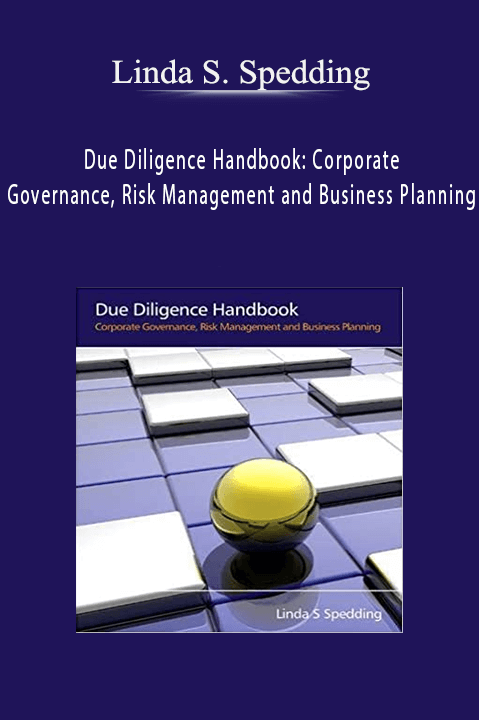Linda S. Spedding – Due Diligence Handbook: Corporate Governance, Risk Management and Business Planning
Corporate Governance, Risk Management and Business Planning
Author: Linda S. Spedding
Published: October 2008
Publisher: CIMA Publishing
Pages: 752
Format: Ebook (PDF)
Description
This book brings together practical information on legislation, primary sources, codes and best practice guidance in one volume. A practical handbook for business directors who wish to minimise financial, legal and reputational risks. It combines all matters concerning corporate governance with due diligence issues and in doing so provides you with the information and tools you need to help you protect your business when under taking due diligence, particularly when making international acquisitions.
The book provides clear guidance and case studies to help all involved understand the complexity of issues and to demonstrate the detailed work that is necessary both to ensure that the benefits of an acquisition can be realised and that there are no unexpected problems, for example through damage to corporate reputation that more that offsets the targeted benefits.
As high profile business failures tarnish the reputation of international business it is essential that business responds by having the policies and practices in place in day-to-day operations and in particular, as this book demonstrates, when a major business development such as an acquisition is being implemented.
Following the initial era of codes in the UK and regulation in the USA and major debates as regards the best approach to corporate governance in the common law countries, controversy has developed over which approach is really more appropriate for business planning purposes and risk management.
Given the trend for many UK companies listed on the US market to de-list in favour of the more British approach to corporate governance and in light of more European corporate scandals this book provides a comparative analysis of the European frameworks for governance. The EU approach and the individual jurisdictions of Germany, Italy, the Netherlands and France, in terms of their practical success or failure (with case studies)is covered. With the debate over an EU Constitution and the political stance of Germany (under the Merkel leadership) during its Presidency to revive the Constitution the book assesses the EU approach generally at a time when the competitiveness of companies and key business sectors must consider the thrusting economies of India and China in particular. The link with competitiveness is an increasingly crucial matter.
In connection with due diligence, the book provides an update of the business world in light of the world’s economy and links corporate governance, risk management and business planning to reflect such business, political and regulatory trends and changes.
In recent years there has been much comment and feedback on the effectiveness of the Sarbanes-Oxley approach to corporate governance and many updates on business ethics and sustainability issues, which this book also covers in the context of due diligence. In addition, since there has been a major shift in business awareness to develop, or be seen to develop, a more enlightened approach to climate change coverage of this area is include in the book in the appropriate context of governance, risk management and business planning, as well as the trends in different parts of the world (USA (and some others v many others!). There are case studies within the book on how business is operating in order to respond to this issue with an international dimension and comparison. The whole debate over being carbon neutral has impacted on the airline industry in particular and has relevance to how industry sectors should balance the interests of the different stakeholders and cope with rather fast attitude changes of the media and public (and the regulators).
The importance of energy security has raised key competitiveness issues of major interest and commercial significance. Moreover the angle of fraud in this sector has become more evident. The area of energy security within this book is tied into ethical accounting, fraud, risk etc. and economic crime. These new areas can be set against the background issue of how much of this comes into play with due diligence. How far is this now part of risk management in todays business world.
New legislation is covered in terms of developments with the UK Companies Act and Directors? duties with an increasing need to understand reputational concerns and off balance sheet values since the withdrawal of OFR.
Key Features
The only book that looks at due diligence how it’s used and how to get it right in the context of Corporate Governance, Reputational Risk Management and Business Planning
* A practical guide with case studies and checklists illustrating key business drivers which enable you to monitor risk management effectively
* Covers the latest regulatory UK and EU framework for due diligence, and doing business across international boundaries, India, China, USA etc.
Readership
Chief Finance Officer; Finance Director; Managing Director; Risk Officer; Compliance Officer; Company lawyers – barristers and solicitors; Financial services lawyers- barristers and solicitors; Competition lawyers – barristers and solicitors; In-house lawyers in plcs; Accountants; Auditors; Company secretaries.
Table of Contents
Contents
Acknowledgements
Preface
Author and Contributors
Table of International Statutes
Table of Statutory Instruments
Table of Cases
List of Key Abbreviations
Chapter 1 Introduction and Traditional Due Diligence
Introduction
Legal due diligence
Financial due diligence
Risk and insurance due diligence
Beneficiaries of due diligence
Transactional and operational concerns – integration value post-merger
Other business issues
Drivers for ongoing due diligence
The interaction with risk management and corporate governance
Transactional and operational assessments
References
Appendix 1 – Overview of main issues for a due diligence exercise
Appendix 2 – Initial steps in transactional due diligence in the UK
Appendix 3 – Specimen auction or tender process letter
Chapter 2 Due Diligence In Corporate Finance
Introduction
Due diligence process
Anti-money laundering due diligence
Financial due diligence
Tax
Commercial due diligence
Prior borrowing arrangements
Commercial contracts and other agreements or arrangements
Licences and intellectual property rights
IT
Real estate and business assets
Employees, consultants and directors
Pension arrangements
Insurance
Environment
Warranties and indemnities
References
Appendix
Chapter 3 Money Laundering
Introduction
History
Money laundering offences
Measures to prevent money laundering
Conclusion
Chapter 4 Drivers for Due Diligence and Corporate Governance
Introduction
Business benefits through risk/reward balance
Regulatory background and drivers
The choice of vehicle, structure and liability in business
The Limited Liability Partnership
Governance and the balance of interests
Corporate social responsibility
Small business risks, due diligence and risk management
References
Appendix – Example of initial due diligence list for the purchase
of a regulated financial services business
Chapter 5 Key Due Diligence and Corporate Governance Organisational Areas
Introduction
Litigation
Alternatives to litigation
The role of tribunals
Due diligence and late payment issues for business
Business interruption and recovery
Insolvency
Business continuity and operational risk management
Crisis management – a view from the US
References
Appendix – Glossary
Chapter 6 Commercial Due Diligence Case Studies
Introduction
Case study 1 – The biotechnology industry
Case study 2 – The shipping industry
Chapter 7 Reputation Risk Management
Why does reputation matter?
Value of brands and their importance to reputation
Reputation and corporate culture
Examples of major losses of reputation
Integrated reputation risk management
Reputation risk management, the Turnbull Report and the new Combined Code
References
Chapter 8 Cultural Due Diligence
Introduction
A managed risk culture
Change management
Culture clash in mergers and acquisitions: risk mitigation
Appendix 1 – Outsourcing and offshoring – the Indian case study
Appendix 2 – Bridging the digital divide in India through corporate and social
responsibility and the reuse of redundant IT equipment
Chapter 9 Information Technology and E-Commerce: Issues of Due Diligence, Risk Management and Corporate Governance
Introduction
Data handling risks
Contract risk in e-commerce
Business interruption
Technology due diligence: managing legal risk exposure
Management of intellectual property issues
Legal risk issues in Internet commerce
Protecting digital assets
Managing liability issues
Designing a risk management framework
Legal audit
Summary
Appendix – Checklist for implementing a corporate digital asset
management policy
Chapter 10 Corporate Governance Issues
Corporate governance definitions and drivers
The Cadbury Report
The Greenbury Report
The Hampel Review and the Combined Code
London Stock Exchange Listing Rules
The Turnbull Report
Recent developments
Practical corporate governance
The role of risk management
Systems and methodologies for risk management
The Operating and Financial Review
Conclusion
References
Chapter 11 The Sarbanes-Oxley Act of 2002
Introduction
Basic goals of act
Specific aspects of the act
Environmental issues under SOX
Conclusion
Chapter 12 International Dimensions and Corporate Governance: the Indian Perspective
Introduction
History of governance in India
Corporate governance in India
The legal and regulatory framework regarding corporate governance in India
Corporate governance: Indian practice
Capital market regulations
Committees on corporate governance
Other corporate laws of India
Conclusion
Chapter 13 International Dimensions: Corporate Governance in Hong Kong Special Administrative Region and the People’s Republic of China
Background to corporate governance in Hong KongDirectors’ Duties
Transparency and disclosure
Executive pay
Shareholders’ protection
Corporate governance in the People’s Republic of China (PRC)
Chapter 14 International Dimensions: Corporate Governance in Australia
Introduction
What is good corporate governance?
External advice to assist in good governance
HIH – A case study of a catastrophic failure in corporate governance
Conclusion
Chapter 15 Corporate Governance in Japan
Introduction
The core problems of corporate governance in Japan
General meetings of the shareholders
The board of directors
Important asset committees and corporations with committees
Conclusion
Chapter 16 Environmental Due Diligence and Risk Management
Introduction
Transactional tools
Environmental auditing and international standards
Environmental accounting and managerial decisions: governance issues
Environmental insurance: reducing risk and liability
Ethics in international trade, investment and project finance: shared responsibility
Environmental liability
The environmental balance sheet
Trends in transboundary trade and environmental standards
Appendix – Environment, Health and Safety Simple US Company Questionnaire
Chapter 17 Charity Considerations: Issues of Transparency and Governance
Introduction
Accountability and corporate giving
Fundraising and related developments
The Charities Bill
Reporting requirements
Protecting whistleblowers
Governance issues
Trustees duties: governance for non profits in the USA
The Tyson Report
Conclusion
Chapter 18 Governance in the Family, the Family Business and Family Trusts
Introduction
Governance theories and practice
Governance, the family and long-term wealth preservation
The family in business
Family trusts
Conclusion
Appendix
About The Author
Dr Linda Spedding holds an LL.B. (Hons), LL.M., Ph.D. She is a Solicitor (England & Wales), and Advocate (India) and an Attorney (USA). Having worked with international law firms, she set up her own practice and remains a consultant to law firms and institutions. Dr. Spedding has authored many articles for professional journals and several books for a professional and business audience, including “Due Diligence and Corporate Governance”. She has been an international advisor to many commercial and professional bodies both in the private and public sector, including SERM and EFR. She serves on several committees, including the SCI Business Strategy Committee. Dr Spedding is International Sustainability Advisor to the CII and to TERI in India and is as an International Consultant Advisor with the Metropolitan Police Service at New Scotland Yard.
Independent Consultant in Business Risk Management and Due Diligence, and Qualified Lawyer in the UK, EU, India and the USA. Independent Consultant in Business Risk Management and Due Diligence, and Qualified Lawyer in the UK, EU, India and the USA
Digital Download Linda S. Spedding – Due Diligence Handbook: Corporate Governance, Risk Management and Business Planning at Offimc.click Now!
Delivery Information
- Upon ordering the product, a delivery email with download instructions will be sent immediately to you so that you may download your files. If you log in (or create an account) prior to purchase you will also be able to access your downloads from your account dashboard.
- It is a digital download, so please download the order items and save them to your hard drive. In case the link is broken for any reason, please contact us and we will resend the new download link to you.
- If you don't receive the download link, please don’t worry about that. We will update and notify you as soon as possible from 8:00 AM – 8:00 PM (UTC+8).
- Please Contact Us if there are any further questions or concerns you may have. We are always happy to assist!








6 reviews for Due Diligence Handbook: Corporate Governance, Risk Management and Business Planning – Linda S. Spedding
There are no reviews yet.